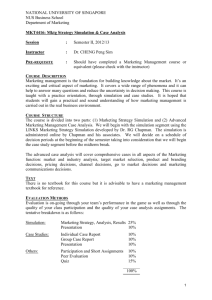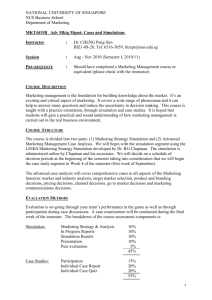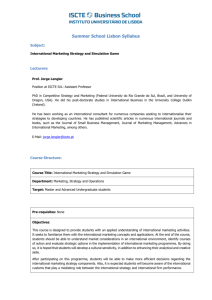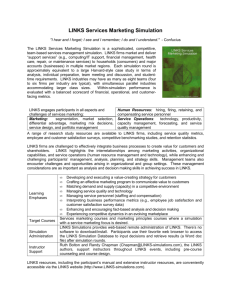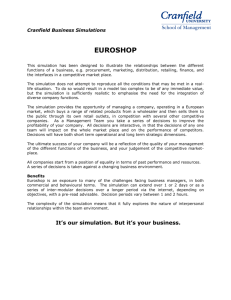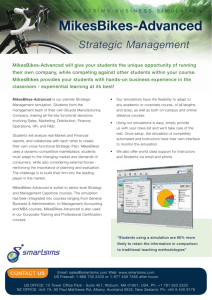Master Course Syllabus
advertisement
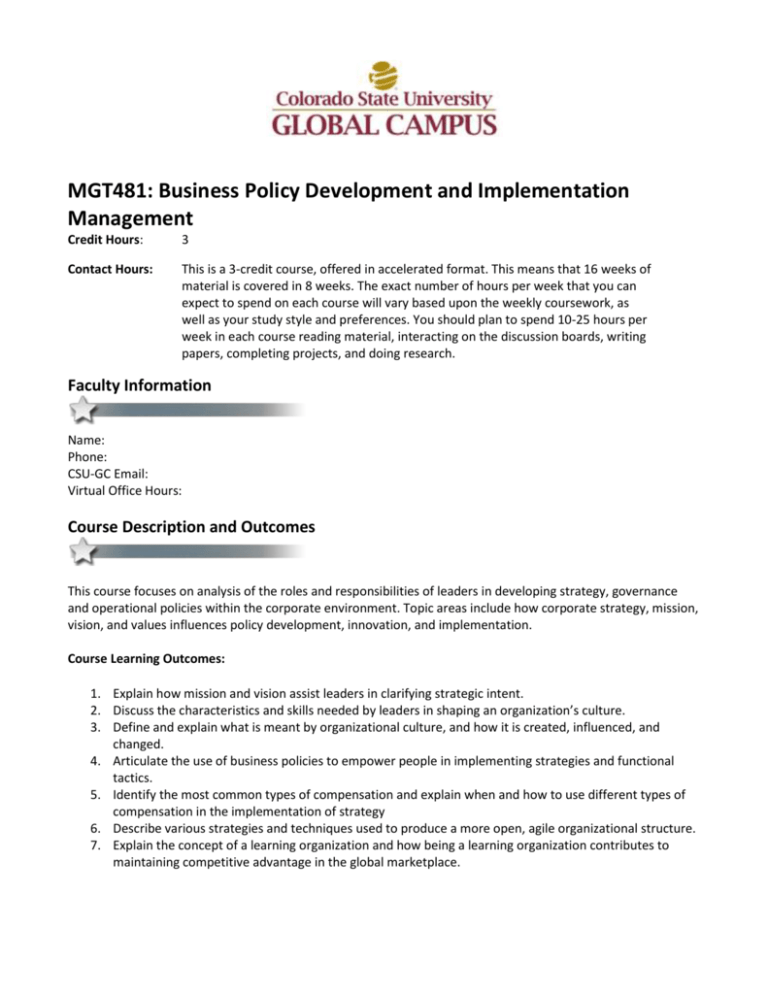
MGT481: Business Policy Development and Implementation Management Credit Hours: 3 Contact Hours: This is a 3-credit course, offered in accelerated format. This means that 16 weeks of material is covered in 8 weeks. The exact number of hours per week that you can expect to spend on each course will vary based upon the weekly coursework, as well as your study style and preferences. You should plan to spend 10-25 hours per week in each course reading material, interacting on the discussion boards, writing papers, completing projects, and doing research. Faculty Information Name: Phone: CSU-GC Email: Virtual Office Hours: Course Description and Outcomes This course focuses on analysis of the roles and responsibilities of leaders in developing strategy, governance and operational policies within the corporate environment. Topic areas include how corporate strategy, mission, vision, and values influences policy development, innovation, and implementation. Course Learning Outcomes: 1. Explain how mission and vision assist leaders in clarifying strategic intent. 2. Discuss the characteristics and skills needed by leaders in shaping an organization’s culture. 3. Define and explain what is meant by organizational culture, and how it is created, influenced, and changed. 4. Articulate the use of business policies to empower people in implementing strategies and functional tactics. 5. Identify the most common types of compensation and explain when and how to use different types of compensation in the implementation of strategy 6. Describe various strategies and techniques used to produce a more open, agile organizational structure. 7. Explain the concept of a learning organization and how being a learning organization contributes to maintaining competitive advantage in the global marketplace. 8. Illustrate the use of controls, continuous improvement, and innovation to guide and monitor strategy implementation. 9. Describe the three key elements of the entrepreneurship process. Participation & Attendance Prompt and consistent attendance in your online courses is essential for your success at CSU-Global Campus. Failure to verify your attendance within the first 7 days of this course may result in your withdrawal. If for some reason you would like to drop a course, please contact your advisor. Online classes have deadlines, assignments, and participation requirements just like on-campus classes. Budget your time carefully and keep an open line of communication with your instructor. If you are having technical problems, problems with your assignments, or other problems that are impeding your progress, let your instructor know as soon as possible. Course Materials Required: Pearce, J. A., & Robinson, R. B. (2013). Strategic management: Planning for Domestic and Global Competition. (13th ed.). Boston, MA: McGraw-Hill/Irwin. ISBN-13: 9780078029295 CAPSIM Simulation, www.capsim.com. Students will receive a course announcement with specific information on registration for the simulation toward the end of Week one. Course Schedule Due Dates The Academic Week at CSU-Global begins on Monday and ends the following Sunday. Discussion Boards: The original post must be completed by Thursday at 12 midnight MT and Peer Responses posted by Sunday 12 midnight MT. Late posts may not be awarded points. Mastery Exercises: Students may access and retake mastery exercises through the last day of class until they achieve the scores they desire. Critical Thinking Activities: Assignments are due Sunday at 12 midnight MT. Week # 1 2 Readings Assignments Chapter 10 in Strategic Management Case 24, TiVo, Inc.: TiVo vs. Cable and Satellite DVRs; Can TiVo Survive? Discussion Board (25) Mastery Exercises (10) Critical Thinking (60) Chapter 11 in Strategic Management Instructions and Background for the Simulation [provided by instructor] Discussion Board (25) Mastery Exercises (10) Chapter 12 in Strategic Management Chapter 13 in Strategic Management Case 30, Wynn Resorts, Ltd. 3 4 5 6 Compensation Series, Parts 1, 2, and 3, found in the SHRM Compensation and Benefits Library Chapter 14 in Strategic Management 7 8 Discussion Board (25) Mastery Exercises (10) Portfolio Milestone: Simulation (30) Discussion Board (25) Mastery Exercises (20) Portfolio Milestone: Simulation (30) Discussion Board (25) Mastery Exercise (10) Critical Thinking (70) Portfolio Milestone: Simulation (30) Discussion Board (25) Mastery Exercises (10) Portfolio Milestone: Simulation (60) Discussion Board (25) Mastery Exercise (10) Critical Thinking (70) Discussion Board (25) Mastery Exercises (20) Portfolio Assignment (350) Assignment Details This course includes the following assignments/projects: Week 1 Critical Thinking: Tivo Case Study (60 points) After carefully reading Case #24: TiVo, Inc: TiVo vs. Cable and Satellite DVR; Can TiVo Survive? Answer the following questions thoroughly in a paper of 5-7 double-spaced pages (in APA format to include a title page and references page): 1. Regarding TiVo's marketing strategy: What is the main marketing strategy for TiVo? Is the strategy sufficient to bring glory or at least give profitability for TiVo? Are changes needed in order for TiVo to perform better, in terms of marketing their product? 2. Regarding TiVo's future: Do you agree with the following statement? Why or why not? "Without financial back up, it is hard to see TiVo's existence last long in such a highly competitive industry unless TiVo does something about it." Portfolio Milestone: You should begin looking over the Capsim Capstone manual and read the background information regarding the company you will be managing. You will be managing a company that makes small, electronic sensors. The Capsim company provides a PowerPoint slide file that will introduce you to the concepts of the game. After reviewing the PowerPoint presentation, and the manual you should view and play up to 4 rounds of rehearsal in the simulation. You play the rehearsal by yourself, and you will receive educational prompts and cues during the entire rehearsal process as a means of coaching through the basics of the program. You can restart the rehearsal once each 24 hour period after completing the first 4 coached rounds. The rehearsal is not graded. Week 2 Simulation Assignment (not graded) Early on Monday or Tuesday, after the official drop date, your instructor will form the teams. He or she will also set up groups in Blackboard for your teams to use to communicate with each other. Your team will play a practice round during this module. There is also a Strategy PowerPoint and a Finance PowerPoint related to the simulation that you should view during this week. Week 3 Simulation Assignment (30 points) Your team will receive feedback on the practice round via a team email from the instructor. Please review your email for instructor feedback based upon team results for Practice Round 1. Your team’s decisions for round 1 are due at the end of the week. Week 4 Simulation Assignment (30 points) Your team will receive feedback on Competition Round 1 in the My Grades area of the course. Your team should work on decisions for round 2 based on the feedback from round 1 and your chosen strategies. Your round 2 decisions are due at the end of the week. Week 5 Critical Thinking: Case Study Wynn Resorts (70 points) After carefully reading Case #30: Wynn Resorts, Ltd., answer the following questions in a 5-7 page paper (in APA style format, double spaced, with a title page and a references page). 1. 2. Where does the Wynn on the Cortai Strip fit on the Wynn Resorts Ltd. Growth and Expansion strategy? Is there support to make a significant capital investment in this resort? Why or why not? Apply Porter’s Five Forces to assist you in advising Wynn Resorts on whether to pursue this expansion at this time. Will building this additional property offer a sustainable competitive advantage for the Wynn Resorts? What is your recommendation? Simulation Assignment (30 points) Your team will receive feedback on Competition Round 2 in the My Grades section of the course. Your team should work on decisions for round 3 based on the feedback from round 2 and your chosen strategies. Your round 3 decisions are due at the end of the week. Week 6 Simulation Assignment (60 points) During this module there will be 2 rounds of decisions due. Round 4’s decisions will be due Thursday of the week at 11:00 pm EST (see your course schedule) and the final round, round 5’s decisions will be due at the end of the week. You will receive your round 3 feedback early in the week to guide your round 4 decisions. You will receive your round 4 feedback shortly after the completion of round 4 to guide your round 5 decisions. Week 7 Critical Thinking: Simulation Team Peer Evaluation (70 points) You have an opportunity to evaluate the contribution and dedication of your fellow team members based upon their work effort in the simulation. Please honestly evaluate the contributions and dedication of all team members, including yourself. The evaluation will be confidential! Only your instructor will see your assessment. Peers can receive a maximum of 100 points. Full description of the exercise and the Team Evaluation Sheet as well as a sample of a completed team evaluation sheet is available here. Portfolio Milestone: You should begin evaluating and summarizing your experiences in playing the business simulation game. Please refer to the instructions for the portfolio paper for the specific requirements of the paper. Week 8 Portfolio Assignment (350 points) Evaluate your team’s success in managing your company over the 5 rounds of the simulation. Your assessment should include some discussion in the areas associated with “Round Analysis” to include Profit, Margin, Emergency Loan, Inventory, and Stock Price. Please reflect on where and how your team might have been more effective in addressing each area. Be sure to provide your rationale for your conclusions with specific examples taken from your company during 5 rounds of the simulation and evaluate your abilities to successfully do so. Remember that your work is reflective in nature and should focus on showcasing learning that has taken place as a result of the activity. Your paper should be at least 7-9 pages in length, but you may take as much space as you need to make your discussion effective. View the Portfolio rubric located under the "Course Information" link to see how you will be evaluated. For project details, see the Portfolio Project Description, which can be accessed from the Week 8 Assignments page. Course Policies Late Work Students are permitted a 7 day grace period during which they may submit a Critical Thinking assignment after the original due date without penalty. Papers submitted between 8 and 14 days after the original due date will be accepted with a potential 10 percent reduction in grade for late submission. Papers submitted 15 or more days beyond the original due date may not be accepted unless prior arrangements have been made with the instructor. No Portfolios will be accepted late and no assignments will be accepted after the last day of class unless a student has requested an incomplete grade in accordance with the Incomplete Policy. Course Grading 20% Discussion Participation 10% Mastery Exercises 35% Critical Thinking Activities 35% Final Portfolio Paper Grading Scale and Policies A 95.0 – 100 A- 90.0 – 94.9 B+ 86.7 – 89.9 B 83.3 – 86.6 B- 80.0 – 83.2 C+ 75.0 – 79.9 C 70.0 – 74.9 D 60.0 – 69.9 F 59.9 or below FN* Failure for Nonparticipation I** Incomplete * Students who stop attending class and fail the course for nonparticipation will be issued the “FN” grade. The FN grade may have implications for financial aid and scholarship awards. ** An “I” grade may be assigned at the Instructor’s discretion to students who are in good standing (passing) in the course. Students should have completed a majority of the coursework in order to be eligible for the “I” grade. Students should request an "I" grade from the Instructor with a written justification, which must include explanation of extenuating circumstances that prevented timely completion of the coursework. If the request is approved, the Instructor will require a written agreement consisting of a) the specific coursework to be completed, b) the plan to complete the coursework, and c) the deadline for completion. The agreement will be kept on file at CSU-Global Campus. An incomplete course must be satisfactorily completed within the time frame stipulated in the agreement, but no later than the end of the following semester from the date the “I” was given. An incomplete not removed within one year shall convert to an F and be included in the computation of the student’s grade point average. Academic Integrity Students must assume responsibility for maintaining honesty in all work submitted for credit and in any other work designated by the instructor of the course. Academic dishonesty includes cheating, plagiarism, unauthorized possession of academic materials, and falsification. The Student Handbook provides information on how students can avoid plagiarism by understanding what it is and how to use library and internet resources appropriately with proper citation. Please refer to the Academic Catalog for complete policies regarding plagiarism and academic dishonesty. APA Students are expected to follow the CSU-Global APA requirements when citing in APA (based on the APA Style Manual, 6th edition). For details on CSU-Global APA style, please review the APA resources located under the Library tab in Blackboard. Netiquette All posts and classroom communication must be conducted in a professional and respectful manner in accordance with the student code of conduct. Think before you push the Send button. Did you say just what you meant? How will the person on the other end read the words? Any derogatory or inappropriate comments regarding race, gender, age, religion, sexual orientation, are unacceptable and subject to disciplinary action. If you have concerns about something that has been said, please let your instructor know. Institutional Policies Refer to the Academic Catalog for comprehensive documentation of CSU-GC institutional policies.
